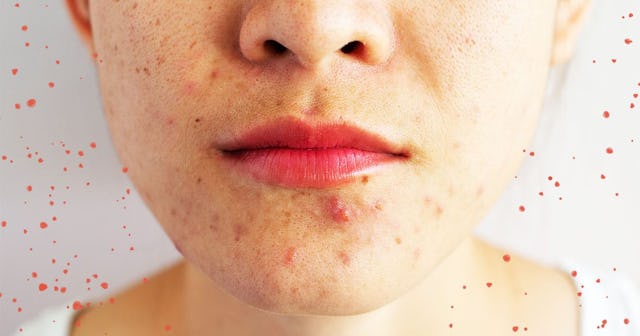A Dermatologist Answers Your Questions About Acne and Masks

I’ll keep it real. Wearing a face mask isn’t comfortable for me, but I do it anyway because I want to protect myself and others from the coronavirus. I’ve tried several masks, and most were flops. I wasn’t trying to look cute. I simply wanted a mask that was reasonably priced and comfortable. Unfortunately, some that I tried were too hard to breathe in, while others caused “maskne.”
What’s maskne, you might be wondering? It’s acne that you can get from wearing a mask. I know you thought you were done with blemishes after that long (and horrendous) stint during your teen years, but acne can come back with a vengeance when wearing a mask. Cue Debbie Downer. If you’re experiencing a similar problem, we’ve got you covered. Here’s everything you need to know about maskne, including what it is and what you can do to remedy it.
Acne from masks, defined.
Dr. Elizabeth Mullans, a board-certified dermatologist, shared with Scary Mommy that face masks absolutely can cause acne. She reported that masks “trap sweat, skin oil and saliva against the skin, therefore disrupting the protective skin barrier and causing irritation.” It gets worse. “Bacteria can then penetrate the skin barrier and cause pimples, while skin oil and products can clog the pores,” she shared. This chain-of-events can lead to pimples, pustules, and blackheads. Ew.
Summer and mask-wearing can cause double trouble.
Plus, it’s summer. Dr. Mullans told us that thicker masks can cause a person to sweat underneath and around the mouth. Given the heat and humidity, which is downright oppressive in some areas, she suggests we opt for a lighter-fabric mask that has breathable material. She also says we should avoid masks made of synthetic materials, especially those of us with more sensitive skin. Aim for a mask that’s made of 100% cotton, because it absorbs moisture and is less irritating than other typical mask materials.
Work to find the right mask for your skin.
The season, plus your skin type, plus your mask materials can make for a trifecta of failure, which is why it’s important to heed the advice of professionals. You may need to drop some dough to find the perfect mask for you, being aware that as the season (and weather) change, you may need a different type of mask. Those of us who wear glasses also need to experiment with different masks due to lens-fogging. Whatever mask you wear, make sure it covers your mouth and your nose. Wearing a mask only over your mouth is defeating the purpose.
Wear the mask.
I shouldn’t have to tell you this, again, but please wear the mask you choose. Though maskne sucks, you aren’t getting a skip-wearing-a-mask pass. Many public arenas, churches, and medical facilities are requiring that entrants wear a mask and keep it on for the health and safety of everyone. After each wear, you need to wash your mask.
Wash your mask properly.
Dr. Mullans shares that it’s important to properly wash your mask in hot water using a fragrance-free, hypoallergenic detergent. Every time you wear the mask, it will need to be washed afterward, since masks attract dust and bacteria. This means, of course, that you need multiple masks for each family member. It’s a good idea to have multiple masks anyway, in case one gets lost or damaged.
Sun protection matters.
One question you might have is about sun protection. If you wear a mask, do you still need to wear sunblock? The answer is yes. Dr. Mullans shares that the mask only covers part of your face. Some people are concerned about the heavier, thicker sunscreens causing acne and discomfort, which is a legitimate worry. Dr. Mullans suggests looking into facial moisturizers, many of which contain a 30 or higher SPF, which she recommends everyone wear daily. It’s never a good idea to ditch the sun protection and increase your cancer risk. Plus, there’s no guarantee the mask is providing you the necessary SPF in the area it’s covering.
Carefully choose your cosmetics.
Some of us already struggle with adult acne. Doesn’t wearing makeup under our masks only make the problem worse? Dr. Mullans says yes, and suggests skipping on putting on makeup under your mask, particularly products you might layer, like foundation. When purchasing makeup, do your research. The best choice is cosmetics that are labeled non-comedogenic. If you need an alternative to heavier products like foundations and powders, she suggests finding a tinted moisturizer.
Wash your face.
Just in case you need to be reminded, wash your face. Doing so means taking a proactive approach to maskne. Wash your face twice a day using a gentle, non-foaming cleanser to get rid of dirt build up and clogged pores. She also suggests looking into a biotin supplement to help overall skin health. Don’t wear your makeup to bed or when exercising, says my own dermatologist.
Experiencing acne at any age is no fun, but luckily there are steps we can take to ditch the maskne that may crop up.
This article was originally published on